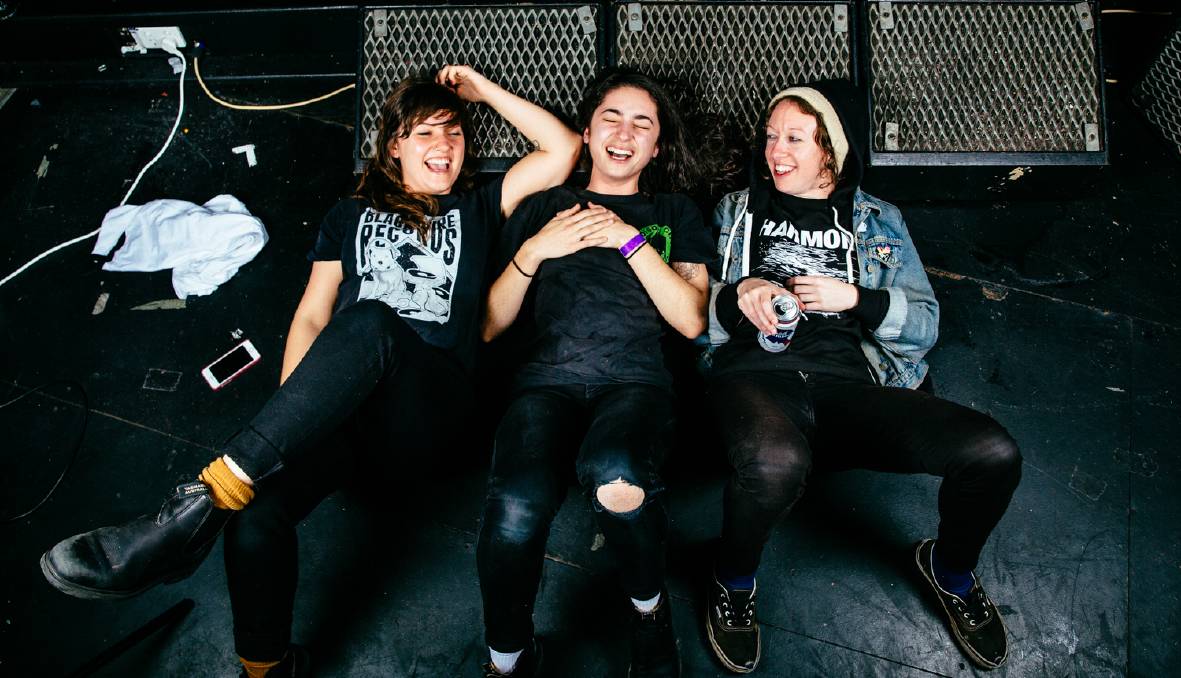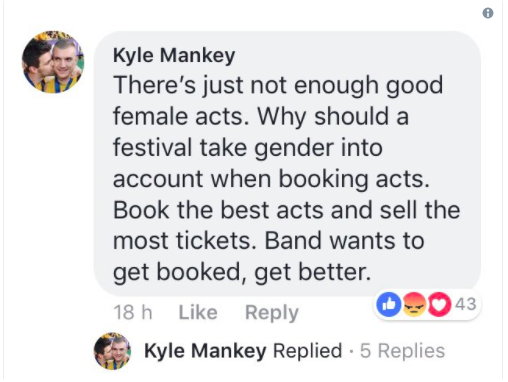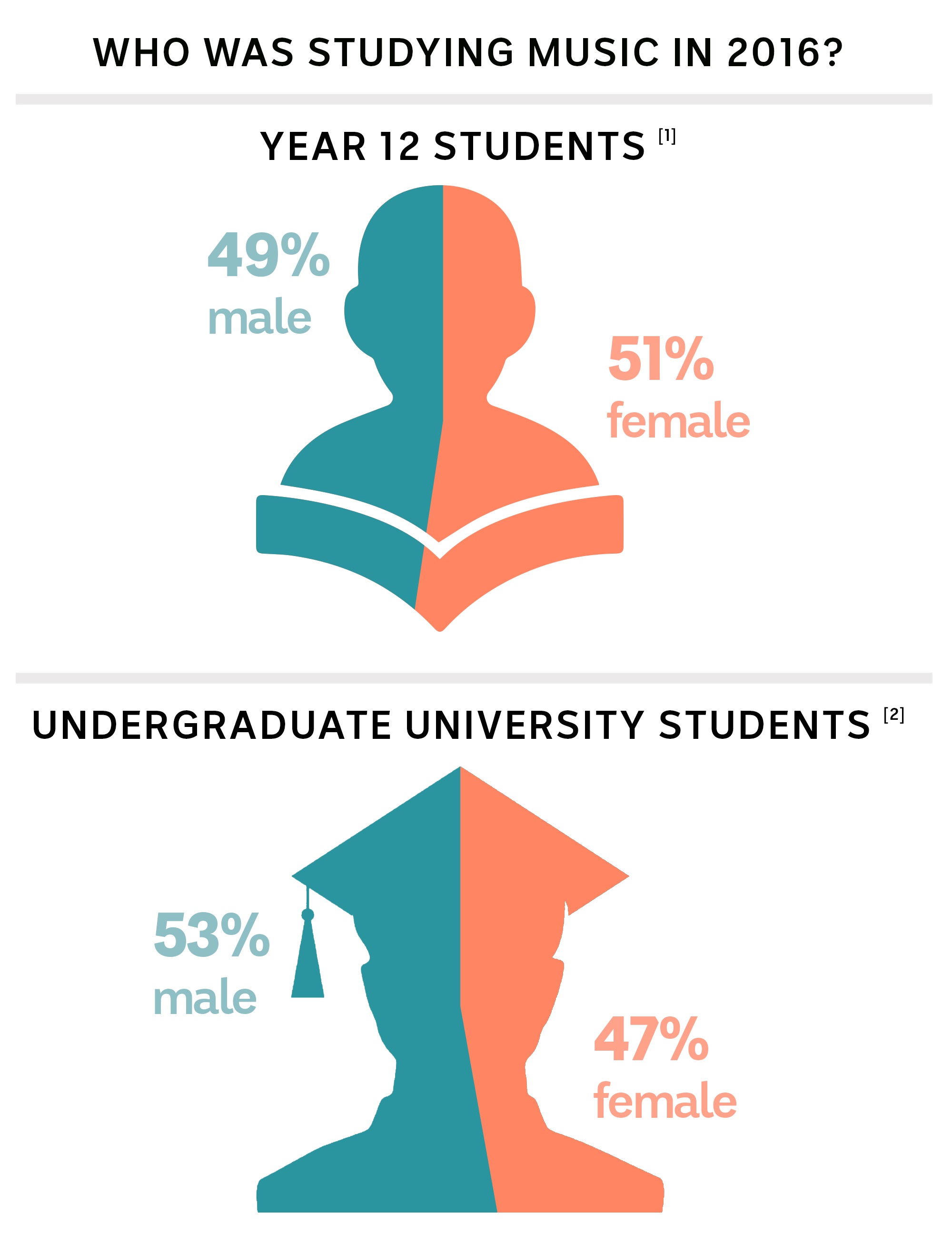A bunch of higher-ups behind the UK PRS Foundation and it’s Keychange initiative have decided to get this whole gender-equality thing underway by pledging gender parity in music festivals and conferences by 2022.

45 International music festivals have committed to the cause, the full list being here if you’re interested. But there’s one country noticeably absent from the pledge: Australia. This comes after Camp Cope’s thrashing of Falls Festival for having only booked nine women for the entire event. The festival responded to the call out with this lil’ beauty:
“We have a long term strategy, which is present on this year’s Falls line up, of giving opportunities to new and middle range female Australian artists, to nurture and grow the future pool of female headline options.”
Despite many of Falls Festivals’ acts coming out in solidarity with Camp Cope, the Festival hasn’t made further comment, pledge, or even hazarded a guess as to when they’re planning on having a real crack at tackling their gender balance problem. In Australia, Laneway festival currently holds the title for the most gender balanced lineup, with a 64% male, 36% female split. Though they haven’t officially committed to gender parity either, the co-founder and festival booker, Danny Rogers told Triple J’s Hack that they definitely consider gender balance when booking a lineup to make, “sure it doesn’t feel one-dimensional in any way”.
But maybe you, like this man, don’t really get the big deal about gender equality in music.

I mean, it’s not like we all open up Spotify and listen to our carefully curated playlists, “Patriarchy 4 lyf <3” and “Men = Good, Ladies = Bad”. We pretty much just listen to what we think sounds good.
But there are reasons behind why we consider some music to be good and some to be bad, and they are intrinsically linked to the culture we live in.
Last year 61% of the songs played on triple j had no female artists involved in the music, and the lineups for two of Australia’s largest music festivals, Falls Festival and Splendour In The Grass, had lineups that were 68% and 74% all-male respectively. Lily Allen also recently tweeted this picture of the lineup for Wireless festival with all the male artists removed, which left only three artists:
The struggle is real pic.twitter.com/R58zKuCaK2
— Lil Yellin (@lilyallen) January 23, 2018
However, according to the ABC’s annual review of gender split in music, numbers of those studying music at both the high school and tertiary level are very evenly split down gender lines, so it’s not like men in general are just more interested than women in music. There’s something else going on.

That same study found that the Triple J Unearthed station is the most evenly split down gender lines in terms of what is broadcast each day, compared to the other triple J affiliated stations, Triple J and Double J. Triple J Unearthed also has the lowest barriers to having your music played on their station, as anyone is able to upload their music once they register as an artist, which most likely accounts for this difference in gender divide. So basically, where there’s low barriers to participation, there’s more women participating and consequently, more people listening to that participation.
So where is it that the gender split widens, and we end up in a Wireless Festival scenario, where only three female acts are booked for an entire festival?
Basically, the numbers of women being listened to declines when you look at larger and more commercial platforms. For instance, only 1 in 5 of the works written by APRA members in 2016 were written by women. 77% of indie record label managers in Australia were also male that year.
An underlying assumption that women will sell less tickets than men still permeates music culture, about which the band Camp Cope have been particularly expressive about their experience, having told Triple J that they have often been told to book smaller venues despite having sold out all their last gigs. They also cover this in their song ‘The Opener’:
“It’s another man telling us we can’t fill up the room
It’s another man telling us to book a smaller venue
‘Nah, hey, c’mon girls we’re only thinking about you’
Well, see how far we’ve come not listening to you”
Further, Julia Jacklin took to Instagram in solidarity with the band, and on the importance of female representation in music:
“Whether or not we realise it at the time, that lack of representation chips away at our belief that we can do this and it chips away at the audiences belief that we can too … Yes, sure we can go start our own festivals but imagine if we could just exist and be valued in the industry as it stands! Crazy right!”
Dr. Catherine Strong’s research for RMIT University also demonstrated that where gender blind auditions were introduced, the number of women accepted into orchestra’s skyrocketed. A key takeaway from Strong’s research is this:
“We know that people judge culture on whether they know a man has made it or a woman has made it. To think that you somehow are immune from these processes, and that you are purely judging music based on whether it is ‘good’ or not, however that judgement is made – I think that’s missing an important aspect of it.”
So where are we? We know that there’s just as many women interested in music as there are men. We know that when barriers to producing music are lower then there is more participation by women. And we know that the culture which we live in inherently affects our judgement of what is good and bad music.
So yes, the pledge for gender parity is great. It’s noble. It’s like, totally bitchin’. But viewing the solution as being merely a quota to fill won’t solve the larger issue of cultural attitudes and the barriers which that attitude creates. It’s hard to make a lineup with a 50/50 gender split if there’s a lot more of one gender creating music than there is of another. In this way, viewing the issue as one about filling a quota is jumping the gun a bit.
We need to go back and examine why there’s not as many female artists who are considered “headliners” and what it is our culture is doing to create this situation.







